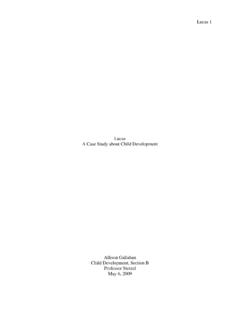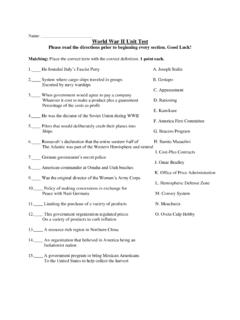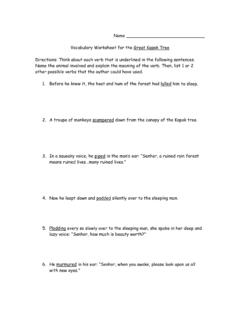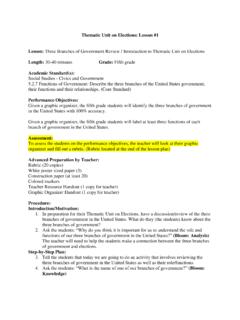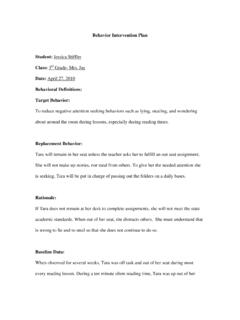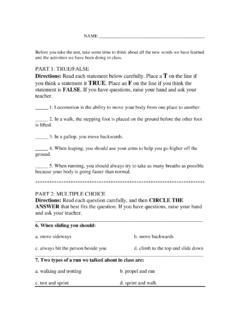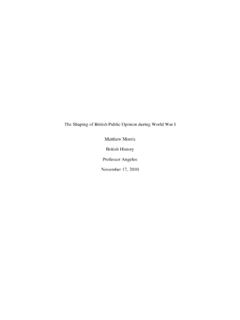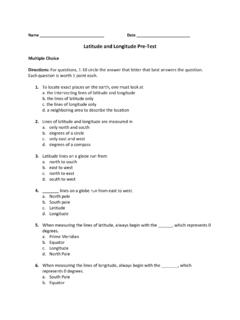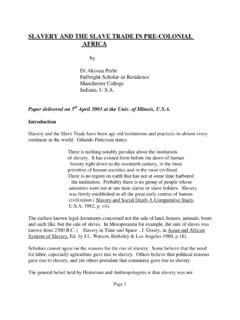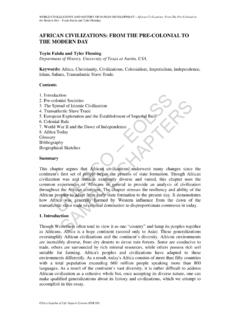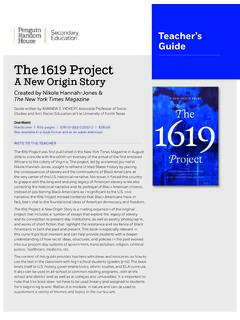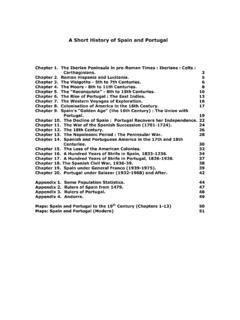Transcription of ESSAY ON CIVIL DISOBEDIENCE - Manchester University
1 ESSAY on CIVIL DISOBEDIENCE 1. ESSAY ON CIVIL DISOBEDIENCE . Henry David Thoreau Henry David Thoreau (1817-1862) was a citizen of standing army, and they are many and weighty, and Concord, Massachusetts, where he lived during the deserve to prevail, may also at last be brought against a middle of the 19th century. He was a good friend of various literary figures of the day, including Ralph standing government. The standing army is only an Waldo Emerson, one of the most eminent of American arm of the standing government. The government authors and a popular orator. itself, which is only the mode which the people have The incident from which the following ESSAY arose was a night that Thoreau spent in jail for refusing to chosen to execute their will, is equally liable to be pay taxes to the government.
2 He was later asked to abused and perverted before the people can act through give a talk about his experiences in jail to the Concord it. Witness the present Mexican war,2 the work of Lyceum on January 26, 1848, and this talk was then comparatively a few individuals using the standing committed to paper and published in an obscure journal, where it was promptly forgotten. government as their tool; for, in the outset, the people Although Thoreau's writing achieved little fame would not have consented to this measure. during his lifetime, his ESSAY on CIVIL DISOBEDIENCE was [ ] The practical reason why, when the power is later re-discovered by Mohandas Gandhi, who came once in the hands of the people, a majority are per- across it while studying law at Oxford as a young man.
3 Gandhi later used the ESSAY as a foundation for his mitted, and for a long period continue, to rule, is not efforts in India resisting the British government through because they are most likely to be in the right, nor CIVIL DISOBEDIENCE . Through Gandhi, Thoreau's work because this seems fairest to the minority, but because also became known to Martin Luther King, who made they are physically the strongest. But a government in use of it during his resistance in the 1960's to the racial segregation laws in the United States. which the majority rule in all cases cannot be based on Thoreau is probably best known in the United justice, even as far as men understand it.
4 Can there not States for his longer work Walden, in which he recounts be a government in which majorities do not virtually his two-year stay at Walden pond. But internationally, decide right and wrong, but conscience? in which Thoreau's fame rests on the brief ESSAY printed in abridged form below which, although of little conse- majorities decide only those questions to which the rule quence in his own day, went on to transform our view of of expediency is applicable? Must the citizen ever for a the political world. moment, or in the least degree, resign his conscience to the legislator? Why has every man a conscience, then? I HEARTILY accept the motto That government is I think that we should be men first, and subjects after- best which governs least ; and I should like to see it ward.
5 It is not desirable to cultivate a respect for the acted up to more rapidly and Carried law, so much as for the right. The only obligation out, it finally amounts to this, which also I believe which I have a right to assume, is to do at any time That government is best which governs not at all ; and what I think right. It is truly enough said, that a corpor- when men are prepared for it, that will be the kind of ation has no conscience; but a corporation of conscien- government which they will have. Government is at tious men is a corporation with a conscience. Law best but an expedient; but most governments are usual- never made men a whit more just; and, by means of ly, and all governments are sometimes, inexpedient.
6 Their respect for it, even the well-disposed are daily The objections which have been brought against a 2 [The Mexican War began in March of 1846 and 1 [Thoreau may have been quoting John L. O'Sulli- ended with the Treaty of Guadalupe Hidalgo (signed van: Understood as a central consolidated power, February 2, 1848). The immediate causes of the war managing and directing the various general interests were the annexation of Texas by the United States, of the society, all government is evil, and the parent and the desire by the United States to purchase of evil. The best government is that which gov- present-day California and New Mexico. The erns least.]]
7 From his Introduction to The United Mexican government refused to sell their land, so States Magazine and Democratic Review (1837).] the government took it by armed force.]. 2 Henry David Thoreau made the agents of injustice. [ ] of the quantity of the danger and grievance on the side, How does it become a man to behave toward this and of the probability and expense of redressing it on American government today? I answer that he cannot the other. Of this, he says, every man shall judge for without disgrace be associated with it. I cannot for an himself. But Paley appears never to have contemplated instant recognize that political organization as my gov- those cases to which the rule of expediency does not ernment which is the slave 's government also.
8 Apply, in which a people, as well as an individual, must All men recognize the right of revolution; that is, the do justice, cost what it may. If I have unjustly wrested right to refuse allegiance to and to resist the gov- a plank from a drowning man, I must restore it to him ernment, when its tyranny or its inefficiency are great though I drown myself. This, according to Paley, and unendurable. But almost all say that such is not the would be inconvenient. But he that would save his life, case now. But such was the case, they think, in the in such a case, shall lose Thus people must cease to Revolution of If one were to tell me that this was hold slaves, and to make war on Mexico, though it cost a bad government because it taxed foreign commodities them their existence as a people.
9 [ ]. brought to its ports, it is most probable that I should not Practically speaking, the opponents to a reform in make an ado about it, for I can do without them: all Massachusetts are not a hundred thousand politicians in machines have their friction; and possibly this does the South, but a hundred thousand merchants and enough good to counterbalance the evil. At any rate, it farmers here, who are more interested in commerce and is a great evil to make a stir about it. But when the agriculture than they are in humanity, and are not pre- friction comes to have its machine, and oppression and pared to do justice to the slave and to Mexico, cost what robbery are organized, I say, let us not have such a it may.
10 I quarrel not with far-off foes, but with those machine any longer. In other words, when a sixth of who, near at home, co-operate with, and do the bidding the population of a nation which has undertaken to be of those far away, and without whom the latter would the refuge of liberty are slaves, and a whole country is be harmless. We are accustomed to say, that the mass unjustly overrun and conquered by a foreign army, and of men are unprepared; but improvement is slow, subjected to military law,4 I think that it is not too soon because the few are not materially wiser or better than for honest men to rebel and revolutionize. What makes the many.

